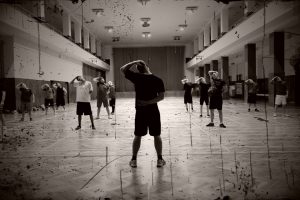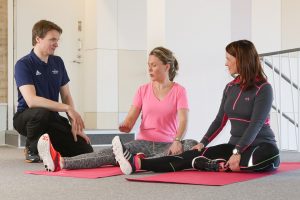 Muscle strain or hip flexor injuries are effects of too much movement or activities such as running and kicking without prior stretching. These kinds of injuries restrict and limit your mobility or movement. Athletes like basketball players, soccer players, dancers, and gymnasts are prone to these types of injuries.
Muscle strain or hip flexor injuries are effects of too much movement or activities such as running and kicking without prior stretching. These kinds of injuries restrict and limit your mobility or movement. Athletes like basketball players, soccer players, dancers, and gymnasts are prone to these types of injuries.
When this does happen, there are prescription medications to ease the discomfort and decrease inflammation. There are also other treatments or procedures like surgery to treat muscle or hip flexor pains. But why wait for this to happen when you can avoid them. Here are a few tips on how to unlock your hip flexors and avoid muscle surgery while there’s still time.
What are the types of muscular injuries?
 Muscles can be regulated or controlled and be made to tighten or contract. It is vital to differentiate muscles from tendons, bone and muscle connections. The degree of an injury is determined by the affected muscles and the extent of tearing. There are 3 types of muscular injuries:
Muscles can be regulated or controlled and be made to tighten or contract. It is vital to differentiate muscles from tendons, bone and muscle connections. The degree of an injury is determined by the affected muscles and the extent of tearing. There are 3 types of muscular injuries:
- CONTUSION is triggered when muscle strands receive an impact or force. Muscles are then compressed or crushed becoming irritated and even ripped or torn.
- ELONGATION is when a muscle is overextended or stretched further than its ability or capacity. Because of this, muscle strands can then be ripped or torn.
- STRAIN is created when a muscle does extreme and fast tightening or contraction. This tightening or contractions can be robust or forceful that muscle strands or fibers may not be able to endure it.
Indications of Muscle Injuries
 When a muscle has received an injury the following symptoms may be seen or felt:
When a muscle has received an injury the following symptoms may be seen or felt:
- Visibility of hematoma, a solid inflammation of clotted or coagulated blood within the flesh or tissue.
- Pain, discomfort, or soreness on affected area especially when touched
- Weakness or loss of strength
- Sometimes malformation, disfigurement or deformity may occur
Here are Some Preventive Measures
- Warm-up. It’s good to do warm-up exercises before doing any rigorous activities. Warm-up exercises are done to promote and raise blood circulation in the body.
 Warming up the body and muscles decreases the probability of straining or injuring your muscles. Stretching loosens up the muscles to increase flexibility. It lowers tension or stiffness in muscles and offers an improved range of mobility.
Warming up the body and muscles decreases the probability of straining or injuring your muscles. Stretching loosens up the muscles to increase flexibility. It lowers tension or stiffness in muscles and offers an improved range of mobility.
- Increase your vitamin D intake. Studies have shown that vitamin D plays an important part in the function of muscles and bones. Vitamin D deficiency is typical in sports players or athletes and is related to muscle weakness and deterioration. So, increase your vitamin D intake for stronger bones and muscles.
- Do the correct workout or exercise techniques. For most athletes, especially weight-lifters or trainers, wrong or incorrect execution of lifting techniques can tug or pull a muscle
 or even rip or tear fragile connective tissues very quickly. When doing an exercise or if you decide to lift some weights, make sure that you are executing it properly to avoid muscle injury.
or even rip or tear fragile connective tissues very quickly. When doing an exercise or if you decide to lift some weights, make sure that you are executing it properly to avoid muscle injury.
- Drink plenty of water. Drinking water sufficiently is very important to prevent injury and for improving athletic A dry or dehydrated tissue or joint is more inclined to injury and tears. It also adds extra stress or strain on the body causing imbalance.
- Preserver your collagen’s health with Vitamin C. To keep bones together, collagen is a
 necessity. It is also responsible for the strength and flexibility of tendons and ligaments.
necessity. It is also responsible for the strength and flexibility of tendons and ligaments.
- Zinc. If you have injured yourself, Zinc is a very significant mineral for faster healing of tissue aside from making your immune system stronger. Good sources of zinc are oysters, red meat, poultry, beans, nuts, dairy products, and certain seafood like crab and lobster.
- Rest is as important as exercise. Rest is when your body is in a state of inactivity. Rest encourages your body to calm down and recuperate its strength especially after any type of rigorous activity. Lack of rest allows muscle fibers to be susceptible to tearing and/or further injury.
VIDEO: Sports Injuries – 4 Tips for Prevention & Recovery
Bottom line:
Protect your muscles. Stretches are important before engaging in any type of strenuous activities. If an injury had accidentally occurred, prevent it from further damage by applying acceptable first aid procedures and then consult a doctor. Injury can be prevented by following safety measures. Remember prevention is always better than cure.

 Warming up the body and muscles decreases the probability of straining or injuring your muscles. Stretching loosens up the muscles to increase flexibility. It lowers tension or stiffness in muscles and offers an improved range of mobility.
Warming up the body and muscles decreases the probability of straining or injuring your muscles. Stretching loosens up the muscles to increase flexibility. It lowers tension or stiffness in muscles and offers an improved range of mobility. or even rip or tear fragile connective tissues very quickly. When doing an exercise or if you decide to lift some weights, make sure that you are executing it properly to avoid muscle injury.
or even rip or tear fragile connective tissues very quickly. When doing an exercise or if you decide to lift some weights, make sure that you are executing it properly to avoid muscle injury. necessity. It is also responsible for the strength and flexibility of tendons and ligaments.
necessity. It is also responsible for the strength and flexibility of tendons and ligaments.